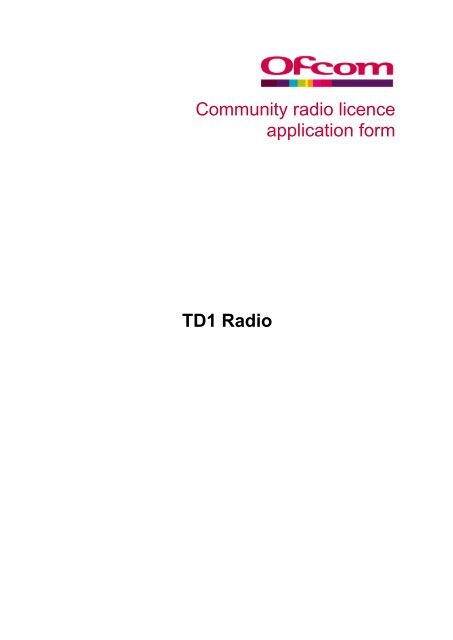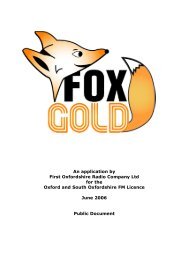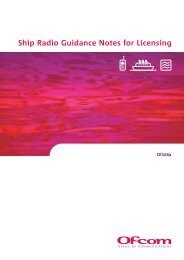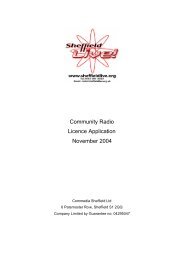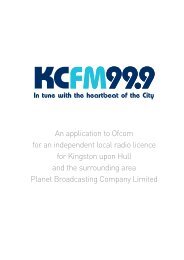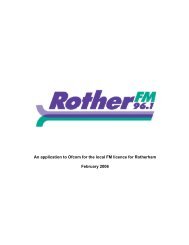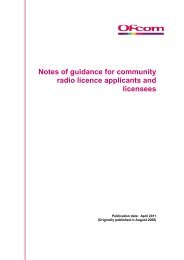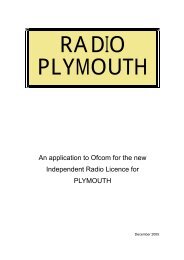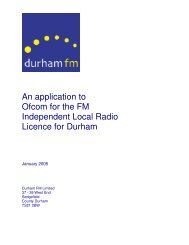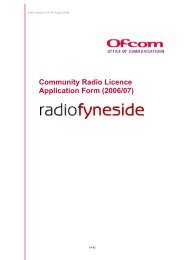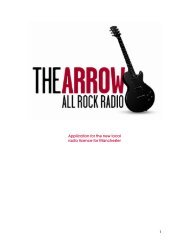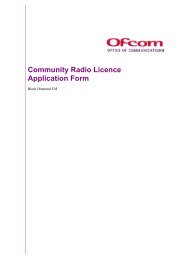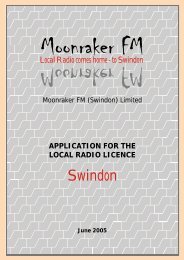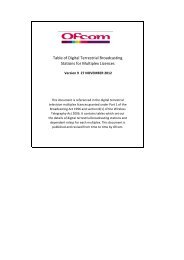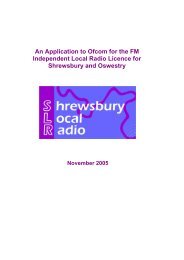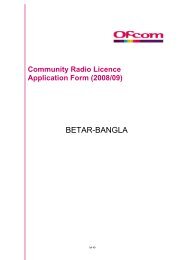Community radio licence application form TD1 ... - Ofcom Licensing
Community radio licence application form TD1 ... - Ofcom Licensing
Community radio licence application form TD1 ... - Ofcom Licensing
You also want an ePaper? Increase the reach of your titles
YUMPU automatically turns print PDFs into web optimized ePapers that Google loves.
<strong>Community</strong> <strong>radio</strong> <strong>licence</strong><br />
<strong>application</strong> <strong>form</strong><br />
<strong>TD1</strong> Radio
<strong>TD1</strong> Radio <strong>application</strong> <strong>form</strong><br />
1. Station Name Guidance Notes<br />
What is the proposed station name? This is the name you expect to use to identify the station<br />
on air.<br />
Answer:<br />
<strong>TD1</strong> Radio<br />
2. <strong>Community</strong> to be served Guidance Notes<br />
Define the community or communities you are<br />
proposing to serve. Drawing from various sources of<br />
data (e.g. from the Office of Population, Census and<br />
Survey) and in relation to your proposed coverage<br />
area, please determine the size of the population<br />
concerned and the make-up of the population as a<br />
whole, along with any relevant socio-economic<br />
in<strong>form</strong>ation that would support your <strong>application</strong>.<br />
(Please tell us the sources of the in<strong>form</strong>ation you<br />
provide.)<br />
Answer in fewer than 300 words:<br />
1<br />
It is a legislative requirement that a service is intended<br />
primarily to serve one or more communities (whether or<br />
not it also serves other members of the public) and we<br />
need to understand who comprises that community or<br />
communities. The target community will also be<br />
specified in the <strong>licence</strong>, if this <strong>application</strong> is successful.<br />
The legislation defines a ‘community’ as: people who live<br />
or work or undergo education or training in a particular<br />
area or locality, or people who have one or more<br />
interests or characteristics in common.<br />
<strong>TD1</strong> Radio will serve those persons living and working in the Central Borders including Galashiels, Tweedbank,<br />
Melrose and Selkirk.<br />
We will ensure that areas of deprivation such as Langlee in Galashiels and Bannerfield in Selkirk are given<br />
proper representation.<br />
<strong>TD1</strong> Radio will offer the area a proper community based <strong>radio</strong> station giving the people in the area the chance to<br />
become involved to a greater extent than currently on offer from existing local non-BBC services.<br />
The combined population (according to 2001 census data) is 21,593. These people have no other option but to<br />
listen to programming from Glasgow at certain times of the day and night, and the area has little or no local TV<br />
coverage now that Border TV has merged with Tyne Tees and is being broadcast from Gateshead.<br />
<strong>TD1</strong> Radio aims to enhance the area‟s identity by including the wealth of local business, charities, community<br />
groups, non-profit making organisations that currently struggle to have their voices and opinions heard.<br />
There are a large number of „mature‟ people in the area, including OAPs and others who are retired. We intend to<br />
provide output for this often forgotten demographic when it comes to <strong>radio</strong> programming, with our varied output<br />
also catering for many interest groups. <strong>TD1</strong> Radio caters for listeners of all ages through our unique blend of<br />
programming. We will also cater for youngsters, school leavers and the unemployed who get little or no<br />
representation on existing local services.<br />
3. Proposed area Guidance Notes<br />
What is the area you propose to serve? It is <strong>Ofcom</strong> policy that community <strong>radio</strong> stations usually<br />
serve an area of up to a 5 kilometre radius from the<br />
transmission site. See ‘Coverage and planning policy<br />
for analogue <strong>radio</strong> broadcasting services’.<br />
Answer:<br />
Central Borders including Galashiels, Tweedbank, Melrose and Selkirk.<br />
http://stakeholders.ofcom.org.uk/binaries/broadcast/radi<br />
o-ops/coverage/analogue-coverage-policy.pdf
Programmes and programme output:<br />
Definitions:<br />
<strong>TD1</strong> Radio <strong>application</strong> <strong>form</strong><br />
Studio location: The studio from which the service will be broadcast should be located within the licensed area.<br />
(In some instances, and by prior written agreement from <strong>Ofcom</strong>, it may be acceptable for the primary studio to be<br />
located outside the licensed area.)<br />
Locally-produced: it is anticipated that most stations will produce the bulk of their output themselves, in the<br />
locality. However, for some target communities it may be appropriate for fairly high levels of output to originate<br />
from outside the licensed area.<br />
Live output: is that which is produced by a presenter in the studio at the time of broadcast. The amount of live<br />
output may vary between different services depending on the needs or expectations of the target community.<br />
Peak time: it may be helpful to state what material will be broadcast in ‘peak time’. If you do, please say what<br />
you consider peak time to be for your target community (this may vary from station to station).<br />
Automated output/voice-tracked material: most stations will carry automated output at some time. The amount of<br />
automated or voice-tracked material does not need to be specified in the key commitments.<br />
Sustaining service/third party produced material: if you intend to broadcast material produced by a different<br />
organisation please state what it is and how much (per day or week as appropriate).<br />
4. Programming output Guidance Notes<br />
Please fill-in all three questions below<br />
Question A asks you to describe your programme<br />
service.<br />
Question B relates to how your output will serve the<br />
tastes and interests of your target community.<br />
Question C is about how your service will broaden<br />
the range of local (non-BBC) services available in<br />
your area.<br />
Later in this <strong>form</strong> you will be asked to draft your own<br />
„key commitments‟. This will <strong>form</strong> the basis of your<br />
<strong>licence</strong> and is what <strong>Ofcom</strong> will judge you against. It<br />
should include a summary of your proposed<br />
programme output as set out below and reflect your<br />
commitment to cater for relevant tastes and interests,<br />
to broaden the range of relevant programmes and<br />
services and to provide a service with a distinct<br />
nature and content as set out in the Guidance Notes<br />
in the column opposite.<br />
4. Programming output<br />
The law requires applicants to state their proposals for<br />
providing a service that would:<br />
(i) cater for the tastes and interests of members of its<br />
target community or communities (or for any<br />
particular tastes and interests in those communities);<br />
(ii) broaden the range of programmes available on non-<br />
BBC local services (commercial and community<br />
stations) to members of the relevant community or<br />
communities;<br />
(iii) broaden the overall range of such non-BBC local<br />
services provided in the area concerned; and<br />
(iv) have a distinct nature, or provide distinct content,<br />
from any non-BBC local services with which it would<br />
overlap.<br />
<strong>Ofcom</strong> is required to consider the extent to which an<br />
applicant’s proposals will cater for the tastes and<br />
interests of members of its target community or<br />
communities.<br />
<strong>Ofcom</strong> is also required to consider the extent to which<br />
proposals for a community <strong>radio</strong> station would broaden<br />
the range of programmes available by way of non-BBC<br />
local services (both commercial and community stations)<br />
in the area concerned (especially, the extent to which a<br />
proposed service would have a distinct nature or provide<br />
distinct content from any overlapping non-BBC local<br />
services).<br />
The in<strong>form</strong>ation given here should be more detailed than<br />
what you set out in your draft key commitments (later in<br />
this <strong>form</strong>), and will help us gain a fuller understanding of<br />
how you will serve your target community and what the<br />
station will sound like.<br />
A: Please tell us about your programme service The following questions may help you describe your<br />
programme service (but should only be used as a guide):<br />
What will the service sound like?<br />
What music will you play?<br />
What are the main speech elements of the service and how will the social gain/community benefits you<br />
2
<strong>TD1</strong> Radio <strong>application</strong> <strong>form</strong><br />
3<br />
propose be reflected on-air?<br />
What is the likely music to speech ratio?<br />
Will this vary at different times of the day or week (or year)?<br />
Do you intend to broadcast live output? If so when and how much do you propose to do?<br />
Will you broadcast in languages other than English (what languages and how much)?<br />
Will your output be original i.e. produced for your service alone?<br />
Will it be locally produced?<br />
Do you intend to repeat material?<br />
Answer in fewer than 1,000 words:<br />
The station will typically broadcast live, mainly locally produced programming for ten hours per day between the<br />
hours of 06:00 and 22:00. Live programming will typically comprise 80% music and 20% speech during daytime<br />
hours. The majority of our programmes will be produced exclusively by us, for us, with one of our programmes<br />
(The Sunday Getherin‟), being outsourced to Celtic Music Radio in Glasgow who asked if they could also<br />
broadcast this programme, albeit on a time shift (+2hr) delay.<br />
Some specialist programming (The Emancipation Show, broadcast on a Saturday at 22:00 hours, The Hot Disc<br />
Christian Top 20, broadcast on a Sunday at 08:00 hours and The Hot Disc Country Music Top 40, broadcast on a<br />
Sunday at 12:00 hours) are provided to us as well as other <strong>radio</strong> stations.<br />
Speech output will be in English/Scottish and will include community, local and national news, interviews, phone<br />
ins, discussions, as well as live and pre-recorded interviews. We will also provide a job spot (the area has<br />
suffered badly in recent years due to a decline in the textile and electronics industry) and ensure that we<br />
broadcast featured vacancies every day. This will give listeners the chance to hear about job opportunities that<br />
may suit them, while they listen to our normal live programming (something that previously existed on local BBC<br />
Radio many years ago, but has since disappeared).<br />
We do not anticipate that our music to speech ratio will vary much according to the time of year. We have<br />
planned features/programming to suit seasonal changes (e.g. activities that take place only during the Summer<br />
we would be unable to broadcast during the Winter, to this end we have ensured that sufficient Winter activities<br />
have been scheduled to replace Summer ones in our programme line-up, therefore ensuring an equal ratio of<br />
speech-based programming all year round. We plan to focus our speech based content around our morning<br />
programming (10am – 12pm), have some shorter features/interviews during our afternoon programming (1 –<br />
4pm) and have a 1 hour long magazine type programme broadcast every weekday between 5 and 6pm). This<br />
programme will feature more in-depth interviews and features as well as a round-up of local news stories, live<br />
studio guests, phone-in and pre-recorded interviews. During our live daytime hours we will also feature live news<br />
on the hour from IRN (Sky News Radio) with local news bulletins tagged onto the end of key listening hours (e.g.<br />
during breakfast, lunchtime and drive-time) thus ensuring that listeners get kept up-to-date with not just national<br />
and international news, but also local stories too.<br />
Local charities, non-profit making organisations and community groups will all be invited in to make their own<br />
programmes, as will schools and students from the local University campus. There is currently no media studies<br />
facility locally (the nearest being in Edinburgh) – community <strong>radio</strong> would allow students with an interest in<br />
pursuing a career in <strong>radio</strong> to get some experience by becoming involved in programme making and production as<br />
well as receiving training from experienced members of the team.<br />
Our music features new artists from the local music scene as well as genres such as Pop / Chart / Dance / Rock /<br />
Indie / Alternative / Celtic Rock / Folk / Traditional / Scottish Dance / Blues / Country / Christian / Jazz / Soul /<br />
World Music / Oldies / Classical / Club / as well as listener requests.<br />
It is not our intention to repeat material, with the exception of perhaps any specialist programming which has<br />
been pre-recorded to start with (e.g. The Emancipation Show) or one off “specials” which may warrant a second<br />
airing at a later date.<br />
B: Based on what you have said above, how will your proposed <strong>radio</strong> service cater for the tastes and<br />
interests of your target community/communities?<br />
Answer in fewer than 400 words:<br />
Since we launched in 2008, <strong>TD1</strong> Radio has conducted regular market research thus identifying the needs within<br />
our community. We have also made it our aim to actively seek out other local community groups and
organisations that do not presently have a voice.<br />
<strong>TD1</strong> Radio <strong>application</strong> <strong>form</strong><br />
The Sunday Getherin‟ programme was (until May 2011) carried by the local commercial <strong>radio</strong> station, however<br />
due to corporate networking the programme was axed. The presenter approached <strong>TD1</strong> Radio to enquire if we<br />
would be interested in broadcasting it, which we were delighted to do. The programme has proved to be a big<br />
success and attracts a large number of listeners not only in the local community but also worldwide via our<br />
Internet streaming. This demonstrates that there is an interest and a need for such a programme, which is<br />
backed up by hundreds of comments on the programme‟s Facebook page from listeners saddened at the thought<br />
of their favourite programme being axed. During 2012 we plan to also invite representatives from the local<br />
festivals (Common Ridings, Civic Weeks etc) into the studio to promote and talk about the events.<br />
Local music clubs and groups currently have no specialist programming on <strong>radio</strong> – something we also tackled<br />
last year. The Scottish Shindig was launched in June 2011 and features Scottish Dance Music. It also allows<br />
local fiddle and accordion clubs to advertise their community news, meetings and publicise open days. We have<br />
also broadcast recordings made at recent open days featuring local artists from the Scottish Dance Music Scene.<br />
(Something that is absent on existing local commercial <strong>radio</strong>) Similarly, we now boast a Folk music programme<br />
on a Sunday night, which is presented by two members from local folk music clubs. Again, this provides these<br />
clubs the chance to promote their events and news as well as being able to invite guests into the studio to talk<br />
and play live. During 2012 we also plan to expand the number of local folk clubs that are represented.<br />
On the spoken word front, we successfully launched Langlee Live, a weekly half-hour magazine programme<br />
which covers the issues, news and events from the community of Langlee in Galashiels. We have (and will<br />
continue to) invite guests from the community into the studio to talk about what is happening in their community<br />
as well as discuss burning issues of the moment.<br />
C: How will your proposed community <strong>radio</strong> service add to the range of programmes available on non-<br />
BBC local services (commercial and community stations) to members of the relevant community or<br />
communities, add to the overall range of such services in the area concerned and be different and<br />
distinct from them? Please tell us which non-BBC local services your station will overlap with.<br />
Answer in fewer than 400 words:<br />
We will overlap with Radio Borders, but as mentioned previously, we are already providing different programming<br />
from them. We can happily devote a 30 minute programme to feature local news from a specific community (e.g.<br />
Langlee or Bannerfield), Radio Borders would be unable to do so as it would be deemed unfair to listeners in the<br />
rest of the region. By our very nature, we can focus on these communities and ensure they are given airtime.<br />
During 2012 we plan to move to new studios in Langlee in Galashiels. By basing ourselves in the heart of this<br />
community we can ensure that we are there to provide programming relevant to the community we will serve on<br />
FM.<br />
Our <strong>radio</strong> station can also allow students or young people to make their own programmes and provide training for<br />
them, something that commercial <strong>radio</strong> would have little or no time to do.<br />
Coverage of local charity events or open days is another different service we can provide. Commercial <strong>radio</strong>, by<br />
its very nature, would mean a fee would be charged in most cases, something that a local community group<br />
could not afford. As community <strong>radio</strong> station we can provide the coverage and outside broadcast facilities free of<br />
charge or at a greatly reduced cost. During 2011 we were “on the road” for eight months of the year bringing live<br />
coverage from events right into the homes of our listeners. We already have a diary filling up quickly for coverage<br />
from events for this year. This alone tells us that the event organisers want us to come back and broadcast live<br />
from their events. Listener interaction too is overwhelming, with hundreds of messages and comments being left<br />
for us during and after our outside broadcasts, either by email or on our Facebook page…<br />
To further enhance our output, our media and market research has helped us develop our proposed new<br />
programme schedule where we can now offer new local <strong>radio</strong> features. These include an NHS Borders Health<br />
spot, <strong>Community</strong> Council news, local minority sports news, local charity news, unsigned local bands, local<br />
history, local groups and clubs, youth groups, uni<strong>form</strong> groups and others. Team meetings and discussions<br />
throughout 2012 will bring these to fruition.<br />
All of the aforementioned points ensure that our output is and will be very different to Radio Borders.<br />
4
<strong>TD1</strong> Radio <strong>application</strong> <strong>form</strong><br />
Social gain<br />
5. Social gain Guidance Notes<br />
<strong>Community</strong> <strong>radio</strong> is required to be for the public good<br />
and to bring community benefits, or social gains, to<br />
listeners and participants. The requirement for „social<br />
gain,‟ is one of the key factors that makes community<br />
<strong>radio</strong> stations different from other <strong>radio</strong> services.<br />
Please tell us what community benefits your service<br />
will bring to your target community(ies) and/or the<br />
general public. Please include summaries of<br />
evidence to support your answer.<br />
Your draft „key commitments‟ (later in this <strong>form</strong>)<br />
should include a summary of your proposed social<br />
gain set out below.<br />
Answer in fewer than 1,500 words:<br />
5<br />
Broadcasting legislation specifies a number of<br />
‘characteristics of community <strong>radio</strong> services’. Licence<br />
holders need to ensure their services con<strong>form</strong> to these<br />
characteristics, including in this case the delivery of<br />
social gain.<br />
The legislation sets out social gains that stations must<br />
provide. These are the achievement, in respect of<br />
individuals or groups of individuals in the target<br />
community, or in respect of other members of the public,<br />
of the following objectives –<br />
(a) the provision of a <strong>radio</strong> service to individuals who<br />
are otherwise underserved by such services,<br />
(b) the facilitation of discussion and the expression of<br />
opinion,<br />
c) the provision (whether by means of programmes<br />
included in the service or otherwise) of education or<br />
training to individuals not employed by the station,<br />
and<br />
(d) the better understanding of the particular community<br />
and the strengthening of links within it.<br />
Social gain may also include the achievement of other<br />
objectives of a social nature. 1<br />
Applicants are required to provide evidence that their<br />
service will result in significant social gain to the public<br />
or the target community(ies). Copies of letters or<br />
research reports etc. should not be submitted, but brief<br />
relevant extracts from them, which represent an<br />
accurate and comprehensive summary, may be<br />
included. If we wish to see the source material, we will<br />
ask for it.<br />
<strong>Ofcom</strong> is required to have regard to the extent to which<br />
your proposed service would result in the delivery of<br />
social gain to the public or target community.<br />
(a) the provision of a <strong>radio</strong> service to individuals who are otherwise underserved by such services<br />
<strong>TD1</strong> Radio will focus on under-served target audiences; defined using a wide range of demographic data and<br />
other in<strong>form</strong>ation to ensure our programming meets their specific needs. We will deliver very local and niche<br />
programmes which will be of interest to retired people, the unemployed, youths, students, single parents and<br />
minority groups.<br />
We will cover local events such as carnivals, music festivals, open days, educational activities, some sporting<br />
events, and will encourage local groups to get involved, make their own programming and be interviewed about<br />
their activities and work that they do. We expect to continue to work with a number of community groups such as<br />
BAAGS, Rowan Boland Trust, Borders Barmy Army, Borders Animal Welfare, Callum‟s Trust, Walkabout Crafts,<br />
Volunteer Centre Borders and the Borders Adult Learning & Achievement Group, to name just a few.<br />
We already have (and will continue to) be committed to having an equal rights opportunity policy, which has been<br />
recognised by Volunteer Development Scotland. They are now using <strong>TD1</strong> Radio as a case study to be offered<br />
out to other Voluntary groups in Scotland as evidence of our good practice. Our innovative work has ensured that<br />
one of our presenters with a deteriorating eye condition is still able to present her programme and is clear<br />
evidence of our equal opportunities policy.<br />
1 See Article 2(3) of the <strong>Community</strong> Radio Order 2004 and <strong>Ofcom</strong>‟s Notes of guidance for community <strong>radio</strong><br />
applicants and licensees.
(b) the facilitation of discussion and the expression of opinion,<br />
<strong>TD1</strong> Radio <strong>application</strong> <strong>form</strong><br />
Local people and organisations can access the service provided by <strong>TD1</strong> Radio to promote their interests and<br />
activities. We will provide a plat<strong>form</strong> which is inclusive and reflective of the diversity of the communities in the<br />
area. We will focus particularly on promoting the less dominant in our society. The station will continue to target<br />
and engage with as broad a range of local community individuals and groups as possible.<br />
We will broadcast topical discussion programmes and encourage listener interaction by telephone, text, email<br />
and Skype as well as via Social Networking such as Facebook and Twitter. Our open doors policy also means<br />
that people are welcome to come in to talk on air to express their opinion and engage in discussions.<br />
We‟ll also produce <strong>radio</strong> documentaries and features relating to human interest stories that existing <strong>radio</strong><br />
services do not cater for.<br />
(c) the provision (whether by means of programmes included in the service or otherwise) of education or training<br />
to individuals not employed by the station<br />
Our volunteer policy reflects our inclusive commitment to offering participation and training to all members of the<br />
community. We actively seek to recruit volunteers from all backgrounds, so that the station‟s output and work will<br />
reflect the nature of the community. We also recognise and value the contributions made by volunteers and will<br />
continue to provide access to training in production and broadcasting to encourage local creative talent.<br />
Our Station Manager encourages existing presenters to Listen Again to their recent programmes and together<br />
they look at ways to encourage and develop presenters current skills set. (This was something that Volunteer<br />
Development Scotland were very keen to learn about and include in their recent case study)<br />
Thanks to receipt of Awards For All Lottery Funding, free basic <strong>radio</strong> skills courses and station open days will be<br />
operated on a quarterly basis using experienced members of the existing volunteer team as teachers. As part of<br />
our Langlee Live slot we are also offering training to people from within the community. We may also use external<br />
professional trainers from time to time to deal with any training issues or needs that we can‟t address ourselves<br />
(e.g. <strong>radio</strong> and the law) to ensure our volunteers are given the correct in<strong>form</strong>ation to allow them to broadcast<br />
legally with regards to what they can and can‟t say on air.<br />
(d) the better understanding of the particular community and the strengthening of links within it.<br />
We have already, and will continue to work closely with community groups and organisations to help raise<br />
awareness of the <strong>radio</strong> station and vice-versa. We will also broadcast concerns about health issues (NHS<br />
Borders), healthy living and fitness with Borders Sports & Leisure Trust, housing (SBHA, Waverley Housing<br />
Association and other local housing organisations), community safety (working with Lothian & Borders Police)<br />
and develop links with Scottish Borders Council to promote their services and ensure that <strong>TD1</strong> Radio provides a<br />
valuable source of public in<strong>form</strong>ation from local bodies.<br />
Included below are extracts from a few of the local organisations we have worked with:<br />
------------------------------------------------------------------------------------------------------------------------------------------------------<br />
Callum‟s Trust: “As one of our supporters we would like to express our thanks for all you have assisted us with to<br />
date and hope that your support will continue in the future. As a charity we rely on local business and individuals<br />
for support, fund raising and the promotion of Callum‟s Trust.”<br />
------------------------------------------------------------------------------------------------------------------------------------------------------<br />
Walkabout Crafts: “As a local fundraising event organiser, I have had the pleasure of dealing with the staff at <strong>TD1</strong><br />
Radio station for the past two years. They have helped us promote our fund raising events on air as well as<br />
attending our events with their outside broadcasting show and entertaining the public „live‟. There is definitely a<br />
demand for a „local‟ licensed community <strong>radio</strong> station and <strong>TD1</strong> would do a great job filling the role.<br />
------------------------------------------------------------------------------------------------------------------------------------------------------<br />
Borders Barmy Army: “<strong>TD1</strong> Radio has been instrumental in our fund raising and we owe them a huge thank you<br />
for the amount of support they give to local organisations like ourselves. DJ Richard Minnikin has regularly invited<br />
our team into the station as guests to do live interviews on our campaigns. Support from the local media can be<br />
very difficult and there is no better support than being advertised on your local community station! This is where<br />
<strong>TD1</strong> Radio is so unique!”<br />
------------------------------------------------------------------------------------------------------------------------------------------------------<br />
BAAGS (Borders Asperger & Autism Group Support): “<strong>TD1</strong> Radio provides a vital link between small,<br />
independent locally based charities such as ours and the communities we serve. As we do not have the financial<br />
6
<strong>TD1</strong> Radio <strong>application</strong> <strong>form</strong><br />
support of large companies, which larger national charities have, we have to rely on the local based media to<br />
help us advertise and promote the service we offer. <strong>TD1</strong> Radio has been exceptionally supportive to us and has<br />
helped us to raise so much more awareness of Autism. Being awarded an FM <strong>licence</strong> would ensure that the vital<br />
connection <strong>TD1</strong> Radio provides in the Scottish Borders, (which is needed, beneficial and crucial to our<br />
community) continues for the future and long-term relationship between the old and young, the towns and<br />
villages, the less-able, the advantaged and the dis-advantaged.<br />
Access and participation:<br />
6. Participation in the service Guidance Notes<br />
How do you propose to ensure that members of your<br />
target community (or communities) are given<br />
opportunities to participate in the operation and<br />
management of the service?<br />
Your draft „key commitments‟ (later in this <strong>form</strong>)<br />
should include a summary of your proposed<br />
participation objectives as set out below.<br />
Answer in fewer than 400 words:<br />
7<br />
Legislation specifies a number of ‘characteristics of<br />
community <strong>radio</strong> services’. Licence holders need to<br />
ensure their services con<strong>form</strong> to these<br />
characteristics, including in this case providing<br />
opportunities to participate in the operation and<br />
management of the service. <strong>Ofcom</strong> requires<br />
in<strong>form</strong>ation as to how this would be achieved.<br />
What will be the involvement of members of the<br />
target community in the <strong>radio</strong> station? How many<br />
volunteers do you anticipate will be involved in your<br />
service per year?<br />
We always have and always will continue to have an open door policy. This open door policy will ensure that<br />
members of the community can come in and see how we operate, learn, and become involved with <strong>TD1</strong> Radio.<br />
We have been broadcasting on the Internet since December 2008 and have already had a large number of<br />
interested people from all walks of life and communities come to see what we do and get involved in various<br />
ways.<br />
Our frequent outside broadcasts also give members of the public the chance to see what we do. At these events<br />
we are keen to promote ourselves and encourage people to drop in and see how <strong>TD1</strong> Radio runs. We always<br />
carry volunteer <strong>application</strong> <strong>form</strong>s with us so that if anyone is interested in becoming part of the presentation team,<br />
working behind the scenes or raising funds for us, we are able to make a note of their details.<br />
We are committed to giving local people the opportunity to participate in <strong>TD1</strong> Radio‟s operation and<br />
management. We will further develop and run a community <strong>radio</strong> station that is owned and controlled by<br />
members of the community. We also plan to have regular open days, publicised on air and through various other<br />
mediums (such as local press, posters, social networking etc) to ensure everyone knows that they can come in<br />
and see what we do.<br />
It is our intention to re-locate to Langlee in Galashiels which will allow our services to become easily accessible to<br />
everyone in the local community. We envisage that our membership will expand and develop quickly (as it is<br />
already doing at the prospect of an FM <strong>licence</strong>) and that <strong>TD1</strong> Radio will be an excellent means of further<br />
engaging the community in programme making, production and management.<br />
A public meeting was held last year where representatives from local organisations and members of the<br />
community were invited to attend. The outcome of the meeting was the creation of a management group as well<br />
as a new relationship with key stakeholders, with whom we will work closely with and gain input from. These key<br />
stakeholders include <strong>Community</strong> Councillors, MSPs and Scottish Borders Council.<br />
We would envisage that at least 50 volunteers per year would be involved in <strong>TD1</strong> Radio.<br />
7. Access to facilities and training Guidance Notes<br />
Set out the practical (<strong>form</strong>al and in<strong>form</strong>al)<br />
mechanisms which you will use to ensure that<br />
members of your target community can gain access<br />
to your facilities that would be used for the provision<br />
<strong>Ofcom</strong> is required by the legislation to have regard to the<br />
provision each applicant proposes to make to allow for<br />
access by members of the target community to the<br />
facilities to be used for the provision of the service and
of your service and to receive training in their use.<br />
Your draft „key commitments‟ (later in this <strong>form</strong>)<br />
should include a summary of your proposed access<br />
and objectives for training people in the use of the<br />
facilities as set out below.<br />
Answer in fewer than 400 words:<br />
<strong>TD1</strong> Radio <strong>application</strong> <strong>form</strong><br />
for their training in the use of those facilities.<br />
Our open days would be a great way of ensuring that people know that they can come in and see what goes on.<br />
From these open days, and from our open doors policy, we would on the first hand make a note of anyone‟s<br />
details who was interested in becoming involved.<br />
We would invite them to join us for an in<strong>form</strong>al chat / discussion to see what they could offer <strong>TD1</strong> Radio and what<br />
we could offer them. Based on the outcome of the discussion we would arrange some in<strong>form</strong>al training to see if<br />
what they wanted to do was right and felt right for them. If the prospective volunteer wanted to proceed we would<br />
then arrange <strong>form</strong>al training sessions with experienced members of the team and / or external professional<br />
trainers.<br />
These sessions could involve, but wouldn‟t be limited to, sitting in the studio during live programmes, shadowing<br />
presenters / producers / dry run sessions (demos) off-air. One-to-one coaching and development sessions, group<br />
training on the basics of <strong>radio</strong> presentation and production, desk o/p during live or pre-recorded programming.<br />
On a more <strong>form</strong>al basis we have already registered ourselves with a few local volunteering organisations,<br />
displayed adverts on our website, Facebook, Twitter pages and produce on-air adverts to let people know we<br />
were looking for volunteers. A link has also been created with our local newspaper, The Border Telegraph, they<br />
regularly carry features about all aspects of <strong>TD1</strong> Radio and our appeals for specialist presenters have proved to<br />
be very successful. We were also featured in the Langlee News newsletter which is delivered to approx 3,000<br />
residents within the community.<br />
Formal training sessions would take place, as per the above, either with experienced members of the team or by<br />
bringing in external people to carry out training on our behalf.<br />
As also mentioned previously, we plan to move to new studios this year which will be a <strong>Community</strong> Hub based in<br />
Langlee, Galashiels. This will place us firmly in the heart of the community ensuring that everyone knows where<br />
we are and how they can get in touch with us. Our Open Days will be well advertised on air and via local press<br />
together with posters around the town.<br />
Ensuring accountability:<br />
8. Accountability Guidance Notes<br />
Please set out your proposed community<br />
accountability mechanisms. These should cover<br />
matters such as:<br />
How will members of your target community:<br />
make contact with your service, and<br />
influence the operation of the service?<br />
How will suggestions or criticisms from members of<br />
your target community (or communities) be<br />
considered and acted upon?<br />
Your draft „key commitments‟ (later in this <strong>form</strong>)<br />
should include a summary of your proposed<br />
accountability measures as set out below.<br />
Answer in fewer than 500 words:<br />
Broadcasting legislation specifies a number of<br />
‘characteristics of community <strong>radio</strong> services’. Licence<br />
holders need to ensure their services con<strong>form</strong> to these<br />
characteristics. One is that, in respect of the provision of<br />
the service, the provider makes itself accountable to the<br />
community (or communities) the service is intended to<br />
serve.<br />
<strong>Ofcom</strong> is required to have regard to the provision each<br />
applicant proposes to make in order to ensure its<br />
accountability to the relevant community (or<br />
communities).<br />
Members of the target community can make contact with us by telephone, email, post, Facebook, Twitter, using<br />
our on-line contact <strong>form</strong> on the website and of course, in person at the <strong>radio</strong> station. We hold regular (monthly)<br />
team meetings to ensure that any comments, opinions, suggestions or complaints are dealt with in an appropriate<br />
8
<strong>TD1</strong> Radio <strong>application</strong> <strong>form</strong><br />
manner, and that the outcome is fed back to the person making contact. Our team meetings consist of on-air<br />
presentation staff, producers, duty managers, station managers and directors being present.<br />
We also plan to hold open meetings to which members of the community can attend and raise any questions<br />
directly with representatives from <strong>TD1</strong> Radio. All the above will ensure that the community can really be part of a<br />
community <strong>radio</strong> station and they will be able to feel that are all contributing something as well as making a<br />
difference.<br />
We will also monitor and assess on a regular basis the strength of our community links will help to shape the<br />
station‟s future development plans and as previously mentioned, our Open Days will provide another method that<br />
will ensure members of the community can keep in contact with us.<br />
We also hold regular meetings / workshops / discussions with our own team to review and monitor our progress<br />
against the objectives and targets that we have set. This will ensure that should one objective or target not be<br />
met, we can address the issue and ensure that it gets resolved. It is anticipated that these workshops will be held<br />
on a quarterly basis to start with; perhaps reducing in frequency to half yearly if our goals are constantly being<br />
met. On the other hand if targets are not being met, we may agree to hold more frequent workshops to allow us<br />
to monitor more closely the progress of our activity and make necessary adjustments to ensure that targets are<br />
being met.<br />
Public surveys and questionnaires are another way to engage the opinions of the public. These can be published<br />
on-line, or we can produce paper-based questionnaires for use at Outside Broadcast events and Open Days and<br />
these can be posted out if required. The results of these surveys will be published on-line, and paper based<br />
copies of the results will also be available. The outcome of such surveys will also be discussed at our team /<br />
public meetings. Paper based surveys can be given to other voluntary groups, charities, organisations etc to<br />
collate for us.<br />
As mentioned previously, we also work closely with our key stakeholders to ensure that the Board of<br />
Management and our entire team are aware of any issues that arise. Our Board of Management will also report<br />
back to the local <strong>Community</strong> Council the on-going developments at <strong>TD1</strong> Radio. Other Local media and press<br />
report on the <strong>Community</strong> Council meetings, therefore through this process the public are aware of what we are<br />
doing and have the chance to respond either through the Newspaper, <strong>Community</strong> Council or directly to us.<br />
Guidance notes: station’s draft key commitments<br />
Please draft the Key Commitments for your proposed service. There is a blank key commitments document<br />
overleaf. If your organisation is awarded a <strong>licence</strong>, the key commitments you draft here will <strong>form</strong> the basis of what<br />
we put in the <strong>licence</strong>. (Please note: this would be subject to <strong>Ofcom</strong>‟s agreement, and we may require it to be<br />
amended, including, for example, to properly reflect legislative requirements).<br />
Your draft Key Commitments should be consistent with, and summarise the answers you have already given in<br />
sections 1-8 of this <strong>application</strong> <strong>form</strong>.<br />
Four sample key commitment documents are provided for in<strong>form</strong>ation at annex 1. These are provided as<br />
illustrations only – it is important that you draft your own commitments, rather than just copying what may have<br />
been done by others, or what we have put in the sample versions. You should keep in mind that it will be a<br />
condition of any <strong>licence</strong> to meet the Key Commitments: something you must do at all times and for breach of<br />
which you could face sanctions including revocation of the <strong>licence</strong>. So, you should think carefully about what you<br />
will be committing to.<br />
We would expect key commitments to be brief, and no more than two pages long.<br />
KEY COMMITMENTS: to be completed by the applicant<br />
Station name<br />
[As in section 1 of this <strong>application</strong>]<br />
<strong>Community</strong> to be served<br />
[In no more than 30 words describe the<br />
community or communities you will<br />
serve. This should be a summary of<br />
section 2.]<br />
9<br />
<strong>TD1</strong> Radio<br />
<strong>TD1</strong> Radio will serve those persons living and working in the Central<br />
Borders including Galashiels, Tweedbank, Melrose and Selkirk.<br />
We will also ensure areas of deprivation are given proper<br />
representation.
Proposed area<br />
[State the proposed coverage area as<br />
set out in section 3.]<br />
Programming output<br />
<strong>TD1</strong> Radio <strong>application</strong> <strong>form</strong><br />
Central Borders including Galashiels, Tweedbank, Melrose and<br />
Selkirk.<br />
[This should be a summary of the answer you have given in section 4, in no more than 200 words]<br />
The station will typically broadcast live, mainly locally originated programming for ten hours per day between the<br />
hours of 06:00 and 22:00. Live programming will typically comprise 80% music and 20% speech during daytime<br />
hours.<br />
Speech output will be in English/Scottish and will include community, local and national news, interviews, phone<br />
ins, discussions, as well as live and pre-recorded interviews. We will also provide a job spot and ensure that we<br />
broadcast featured vacancies every day.<br />
We plan to focus our speech based content around our morning programming (10am – 12pm), have some<br />
shorter features/interviews during our afternoon programming (1 – 4pm) and have a 1 hour long magazine type<br />
programme broadcast every weekday between 5 and 6pm). This programme will feature more in-depth<br />
interviews and features as well as a round-up of local news stories, live studio guests, phone-in and pre-recorded<br />
interviews.<br />
Local charities and community groups will be invited in to make their own programmes, as would schools and<br />
students from the local University campus.<br />
Social gain<br />
[Summarise the answers you have given in section 5.]<br />
<strong>TD1</strong> Radio will focus on under-served target audiences; defined using a wide range of demographic data<br />
and other in<strong>form</strong>ation to ensure our programming meets their specific needs. We will deliver very local and<br />
niche programmes which will be of interest to retired people, the unemployed, youths, students, single<br />
parents and minority groups.<br />
We will cover local events such as carnivals, music festivals, open days, educational activities, some<br />
sporting events, and will encourage local groups to get involved, make their own programming and be<br />
interviewed about their activities and work that they do.<br />
We already have (and will continue to) be committed to having an equal rights opportunity policy. The station<br />
will continue to target and engage with as broad a range of local community individuals and groups as<br />
possible.<br />
Our volunteer policy reflects our inclusive commitment to offering participation and training to all members of<br />
the community. We actively seek to recruit volunteers from all backgrounds, so that the station‟s output and<br />
work will reflect the nature of the community. We also recognise and value the contributions made by<br />
volunteers and will continue to provide access to training in production and broadcasting to encourage local<br />
creative talent.<br />
Participation in the service<br />
[Summarise the answer you have given in section 6.]<br />
We always have and always will continue to have an open door policy. This open door policy will ensure that<br />
members of the community can come in and see how we operate, learn, and become involved with <strong>TD1</strong><br />
Radio.<br />
It is our intention to re-locate to Langlee in Galashiels which will allow our services to become available to<br />
everyone in the local community. We envisage that our membership will expand and develop quickly and<br />
that <strong>TD1</strong> Radio will be an excellent means of further engaging the community in programme making,<br />
production and management.<br />
Access to facilities and training<br />
[Summarise the answer you have given in section 7.]<br />
Our open days and our open doors policy would be a great way of ensuring that people know that they can<br />
10
<strong>TD1</strong> Radio <strong>application</strong> <strong>form</strong><br />
11<br />
come in and see what goes on.<br />
On a more <strong>form</strong>al basis we have already registered ourselves with a few local volunteering organisations,<br />
displayed adverts on our website, Facebook, Twitter pages and produce on-air adverts to let people know<br />
we were looking for volunteers. Formal training sessions would take place, as per the above.<br />
As also mentioned previously, we plan to move to new studios this year which will be a <strong>Community</strong> Hub<br />
based in Langlee, Galashiels. This will place us firmly in the heart of the community ensuring that everyone<br />
knows where we are and how they can get in touch with us. Our Open Days will be well advertised on air<br />
and via local press together with posters around the town.<br />
Accountability<br />
[Summarise the answer you have given in section 8.]<br />
Members of the target community can make contact with us by telephone, email, post, Facebook, Twitter,<br />
using our on-line contact <strong>form</strong> on the website and of course, in person at the <strong>radio</strong> station.<br />
We hold regular (monthly) team meetings to ensure that any comments, opinions, suggestions or complaints<br />
are dealt with in an appropriate manner, and that the outcome is fed back to the person making contact. Our<br />
team meetings will consist of on-air presentation staff, producers, duty managers, station managers and<br />
directors being present.<br />
We will also monitor and assess on a regular basis the strength of our community links which will help to<br />
shape the station‟s future development plans.<br />
As mentioned previously, we also work closely with our key stakeholders to ensure that the Board of<br />
Management and our entire team are aware of any issues that arise. Our Board of Management will also<br />
report back to the local <strong>Community</strong> Council the on-going developments at <strong>TD1</strong> Radio. Other Local media<br />
and press report on the <strong>Community</strong> Council meetings, therefore through this process the public are aware of<br />
what we are doing and have the chance to respond either through the Newspaper, <strong>Community</strong> Council or<br />
directly to us.<br />
[Please note: If awarded a <strong>licence</strong>, the commitments the applicant makes in this section will, subject to <strong>Ofcom</strong>‟s<br />
agreement, <strong>form</strong> the basis of the „key commitments‟ part of its community <strong>radio</strong> <strong>licence</strong>.]<br />
About your organisation:<br />
9. Company details Guidance Notes<br />
The legislation requires that:<br />
<strong>Community</strong> <strong>radio</strong> services should not be provided primarily for commercial reasons or for the financial or<br />
other material gain of the body providing the service or the individuals involved in it<br />
Any profits produced may only be used to either improve the future provision of the service or for the<br />
delivery of social gain to members of the public or the target community<br />
Provide the name of the body corporate (e.g.<br />
company) submitting this <strong>application</strong> and the type of<br />
body corporate.<br />
Please provide copies of the company‟s<br />
Memorandum, Articles of Association and Certificate<br />
of Incorporation (or, where it is another type of body<br />
corporate, its founding documents and those which<br />
set out its objectives and rules of operation)<br />
Only a body corporate can hold a community <strong>radio</strong><br />
<strong>licence</strong>. A body corporate is almost always a<br />
(registered) company, although it can also include, for<br />
example, some bodies created by statute (an individual<br />
or a registered charity on its own is not a body<br />
corporate.).<br />
Your <strong>application</strong> must therefore be submitted on behalf<br />
of a registered company (or other body corporate).<br />
There are different types of company (e.g. a company<br />
limited by shares, a community interest company, a<br />
company limited by guarantee) and we need to know<br />
what kind of company is applying for a <strong>licence</strong>.<br />
We will not consider a <strong>licence</strong> award to a company if it<br />
has not yet been registered. If the <strong>application</strong> is<br />
successful the <strong>licence</strong> will be awarded to the body<br />
corporate (e.g. company) submitting this <strong>application</strong>.
Answer:<br />
Company (or other body corporate) name: Borders <strong>Community</strong> Radio & Media Limited<br />
Date of registration: Still pending<br />
Company registration number: Still pending<br />
<strong>TD1</strong> Radio <strong>application</strong> <strong>form</strong><br />
Type of company (or other body corporate): Non-Profit Making Organisation / Company Limited by<br />
Guarantee<br />
Where your body is not a company, please explain how it meets the requirement to be a body corporate:<br />
10. Ownership Guidance Notes<br />
Please provide details of who controls and who owns<br />
the body corporate (e.g. company) applying for this<br />
<strong>licence</strong>, and on what basis this control and ownership<br />
is achieved. (If this will be different once the station<br />
starts broadcasting please say so (a <strong>licence</strong> is not<br />
issued until broadcasting starts.))<br />
The in<strong>form</strong>ation provided must include:<br />
all the subscribers, members, shareholders,<br />
or whatever is appropriate for the applicant<br />
company (or body corporate), and state the<br />
extent of their interest (e.g. % shareholding)<br />
(if the company will be controlled by<br />
members, but the members are not yet<br />
recruited, please say so). (You will also be<br />
asked about the board of directors in 11 &<br />
12 below.)<br />
details of any individual, company or other<br />
body that may exert control over the<br />
applicant.<br />
Answer:<br />
<strong>Ofcom</strong> needs to know about the ownership of the<br />
company (or other body corporate) applying for this<br />
<strong>licence</strong>, and any issues regarding its control. We will<br />
also consider how the company (or body corporate) will<br />
be run (this will usually be specified in the Articles of<br />
Association of the company).<br />
In relation to exerting control over the applicant, the<br />
in<strong>form</strong>ation provided should include the name and<br />
address of any individuals or corporate bodies in<br />
accordance with whose wishes the applicant’s affairs are<br />
or will be conducted in most cases or in significant<br />
respects.<br />
The station is owned by the elected members of the management board of Borders <strong>Community</strong> Radio & Media<br />
Limited. Subscribers are Graham Ford (Chairman) and David Henderson (Managing Director).<br />
Ability to maintain the service:<br />
11. Management and operations Guidance Notes<br />
With regard to the applicant please provide:<br />
A list of directors, indicating who is the<br />
managing director and/or chair (please see<br />
question 12 regarding directors‟ details)<br />
An indication of management structure (e.g.<br />
management committee or equivalent, if<br />
applicable), and/or<br />
In<strong>form</strong>ation about who would be responsible<br />
for the day to day management and running<br />
of the station (there is a separate question<br />
regarding other staff below). Explain the<br />
role(s) in the station, job titles, and indicate<br />
whether paid or voluntary, full or part-time<br />
(and the number of hours).<br />
In addition to the notes above on ownership, <strong>Ofcom</strong> is<br />
also required to evaluate the human resources involved<br />
in the running of a community <strong>radio</strong> station. Answers<br />
should demonstrate how those who have relevant<br />
experience will work for the station. In addition, a<br />
diagram or organisation chart may help paint a clearer<br />
picture.<br />
12
<strong>TD1</strong> Radio <strong>application</strong> <strong>form</strong><br />
Answer:<br />
Graham Ford (Part-Time 10 hrs Voluntary Chairman)<br />
Audrey Gillies (Part-Time 6 hrs Voluntary Vice-Chairman)<br />
Gerry Monaghan (Part-Time 6 hr Voluntary Treasurer/Finance Director)<br />
Ron Anderson (Part-Time 8 hrs Voluntary Secretary)<br />
David Henderson (Full-Time 40 hrs Voluntary Managing Director, Station Manger + Trainer)<br />
12. Management and operations Guidance Notes<br />
Please provide in<strong>form</strong>ation regarding each director as<br />
set out below (some or all of which may be regarded<br />
as confidential).<br />
In addition if any individuals have been identified for<br />
management roles at the proposed station, please<br />
give further in<strong>form</strong>ation in this section.<br />
Answer (for each director):<br />
David Henderson Managing Director/Station Manager<br />
Other directorships None<br />
Graham Ford<br />
Other directorships None<br />
13<br />
<strong>Ofcom</strong> needs to know about the proposed directors and<br />
chair of the applicant. Some or all of the in<strong>form</strong>ation<br />
given in this section will usually be removed from the<br />
publicly available copy of this <strong>application</strong> <strong>form</strong>. (All<br />
community <strong>radio</strong> <strong>application</strong>s <strong>form</strong>s will be made<br />
available on our website.) If you request that any<br />
in<strong>form</strong>ation be removed, please indicate which (and why<br />
by email to community.<strong>radio</strong>@ofcom.org.uk).<br />
If any individuals (not necessarily directors) have been identified for management roles please state what<br />
experience identified individuals have to undertake the role in question.<br />
Steve Paterson (Assistant Station Manager)<br />
As Assistant Manager, Steve will take on some of the duties assigned to David in his absence. Steve will be<br />
responsible for ensuring any outsourced/pre-recorded programming is loaded onto the computer and ready for<br />
playout at the specified time, according to the programme schedule.<br />
13. Staffing structure Guidance Notes<br />
What is the staffing structure of your proposed <strong>radio</strong><br />
service? Provide a job title for each position and<br />
indicate whether the individual will be paid or will<br />
work in a voluntary capacity, will be full or part-time<br />
(indicate the number of hours for part-time posts).<br />
This may be provided as a diagram or organisation<br />
chart.<br />
Answer in fewer than 400 words, plus organisation chart (optional):<br />
The legislation requires that <strong>Ofcom</strong> has regard to the<br />
applicant’s ability to maintain the proposed service (as<br />
well as to ensure the applicant is fit and proper to hold<br />
the <strong>licence</strong>). As well as its ownership, management and<br />
operations, the proposed staffing of the station is<br />
relevant to these considerations.<br />
Outlined below is the staffing structure for <strong>TD1</strong> Radio. At present we rely totally on volunteers, but we do aim to<br />
create paid roles (as funding becomes available) for the Station Manager and Assistant Station Manager as well<br />
as the Administrator/Receptionist roles. It is also anticipated that a paid IT position would be created too to<br />
remove this role from the Station Manager. We also envisage a part-time paid Marketing and Promotions<br />
Manager role.<br />
Station Manager/Trainer/IT Support (Full Time Unpaid)<br />
Assistant Station Manager (Part Time (20 hours) Unpaid)<br />
Marketing/Promotion Manager (Part Time (10 hours) Unpaid)<br />
Administrator/Receptionist (Full Time (Unpaid))<br />
Transmitter Engineers (2)<br />
Training Officers (2)
Duty Managers (10)<br />
Producers (5)<br />
Technicians (3)<br />
Presenters (20)<br />
14. Applicant’s experience Guidance Notes<br />
Please describe the history of your group, and any<br />
relevant experience of the group, or the individuals<br />
within the group, by answering the questions below.<br />
A. Please provide a brief history of your group.<br />
Answer in fewer than 300 words:<br />
<strong>TD1</strong> Radio <strong>application</strong> <strong>form</strong><br />
<strong>Ofcom</strong> is required to consider whether an applicant has<br />
the ability to run a community <strong>radio</strong> station for the<br />
<strong>licence</strong> period (up to five years). To aid our<br />
consideration we want to know about any relevant<br />
experience the applicant group as a whole, or the<br />
individuals involved, may have.<br />
Following a public meeting held in the Summer of 2008 and some press coverage about the possibility of a new<br />
<strong>Community</strong> Radio Station being born, key individuals, presenters and producers were identified as <strong>form</strong>ing the<br />
backbone of <strong>TD1</strong> Radio. After a few months of planning and further meetings taking place <strong>TD1</strong> Radio went live<br />
on December 1 st 2008. Shortly before we launched we were visited by Jim Hume (MSP) who was keen to see<br />
what we could offer. Michael Moore (MP) was invited to record the station‟s opening speech.<br />
Regular team meetings were held to help us improve and develop our service and from this recruitment drives<br />
and further newspaper coverage has allowed us to expand our on-air and behind the scenes team.<br />
During 2011, when it became apparent that further FM <strong>licence</strong> <strong>application</strong>s were being invited we held more<br />
frequent meetings to allow us to prepare for this <strong>application</strong>.<br />
A second public meeting was held Winter 2011 and from this, other interested individuals were identified who<br />
became part of the presentation, production and management teams.<br />
Just before our third Birthday Michael Moore visited the studio to see how things were progressing and recorded<br />
a short Birthday message for us which we played during our programming. (This saw us broadcast 18 hours of<br />
live locally produced programming from 06:00 until 00:00).<br />
B. Please summarise the group’s broadcasting experience (e.g. internet <strong>radio</strong>, Restricted Service<br />
Licences (RSLs)).<br />
Answer in fewer than 150 words:<br />
We have been broadcasting on the Internet since December 1 st , 2008. Although we are only on-line, we operate<br />
as if we were an FM station; and abide by rules and regulations that would apply if we were on FM and carry out<br />
our programming, production and general operations to the same high standard.<br />
As part of our programming we‟ve carried out live and pre-recorded interviews, whether in person or via<br />
telephone or Skype and broadcast live from events (OBs). All these things (and more) have ensured that our<br />
team have gained a wealth of in<strong>form</strong>ation over the last three years.<br />
Various presenters have been involved with RSLs, BBC, ILR and Hospital Radio over the years; those that have<br />
no previous experience are fully trained before they go live.<br />
C. Please summarise the relevant experience of the group or its members, in relevant non-broadcast<br />
areas (such as third sector, local business, fund-raising, training or education).<br />
Answer in fewer than 150 words:<br />
We have several members of the team who are already involved in other community / voluntary / non-profit<br />
making groups.<br />
We recently applied for funds to Awards For All and our <strong>application</strong> was successful, which has allowed us to<br />
purchase new Outside Broadcast equipment and carry out training etc.<br />
Our group is lucky to have team members from the following backgrounds:<br />
Teaching/Education<br />
Journalism/Editorial<br />
Business Management<br />
14
<strong>TD1</strong> Radio <strong>application</strong> <strong>form</strong><br />
Fund Raising<br />
Accountancy<br />
Training<br />
Publicity<br />
Electrician<br />
IT Support/Networking<br />
Publicity<br />
Planning<br />
Human Resources<br />
D. Please summarise the <strong>radio</strong> broadcasting experience of key individuals in the applicant group (only if<br />
not already described above).<br />
Answer in fewer than 150 words:<br />
Evidence of demand:<br />
15. Demand and/or support Guidance Notes<br />
Please provide a summary of evidence of demand<br />
and/or support for your proposed service.<br />
This may include a variety of in<strong>form</strong>ation, for<br />
example:<br />
15<br />
summary of support from statutory or<br />
voluntary sector organisations which expect<br />
to contribute practically and/or financially to<br />
your operations, or which would expect to<br />
collaborate with you in joint activities;<br />
evidence of interest generated through <strong>radio</strong><br />
activity (e.g. RSLs, internet <strong>radio</strong>),<br />
community activity, training, voluntary sector<br />
work etc;<br />
results of research;<br />
summary of support from local politicians,<br />
councils, educational or religious bodies etc;<br />
summary of support from local business or<br />
other sectors;<br />
evidence of support from your proposed<br />
target community.<br />
Answer in fewer than 1,000 words:<br />
Included below are three more extracts supporting our <strong>application</strong>:<br />
When considering community <strong>radio</strong> <strong>licence</strong> <strong>application</strong>s,<br />
<strong>Ofcom</strong> is required to take into account the extent of local<br />
demand for, or support for, the provision of the proposed<br />
service.<br />
It is for applicants to decide what evidence of demand or<br />
support they wish to submit. However, <strong>Ofcom</strong> does not<br />
believe that generic support for the establishment of a<br />
new <strong>radio</strong> service is as meaningful as evidence of<br />
considered support for a specific applicant’s proposals.<br />
This means that <strong>Ofcom</strong> does not attach great value to<br />
numerous examples of similar generic or <strong>form</strong> letters of<br />
support by your group, or to petitions.<br />
Copies of letters or research reports etc. should not be<br />
submitted. However, your response here may include<br />
brief relevant extracts from such material and must<br />
represent an accurate and comprehensive summary of<br />
any such supporting evidence. If we wish to see the<br />
source material, we will ask for it.<br />
------------------------------------------------------------------------------------------------------------------------------------------------------<br />
The Bridge: (providing community and voluntary sector support) letter: “<strong>TD1</strong> Radio can encourage the community<br />
members to speak out their needs and ideas and help to create knowledge. Currently operating as an Internet<br />
only facility, <strong>TD1</strong> Radio is not able to reach its full potential but with an FM <strong>licence</strong> it will be in a position to better<br />
in<strong>form</strong> the community.”<br />
------------------------------------------------------------------------------------------------------------------------------------------------------<br />
Rt Hon Michael Moore MP: I have recently visited the studio of <strong>TD1</strong> Radio in Galashiels and wish to support their<br />
<strong>application</strong> for an FM Licence. Local <strong>radio</strong> stations such as this are an important link for the local community. In<br />
order to improve the service that it provides, the station is applying for an FM <strong>licence</strong> and I would like to add my<br />
support for this <strong>application</strong>.<br />
------------------------------------------------------------------------------------------------------------------------------------------------------<br />
Ms Christine Grahame MSP: I write to congratulate you on your recent award from the Big Lottery. Local <strong>radio</strong>,<br />
particularly a community based station like yours, is of great interest to me and I would very much like to come
and visit you.<br />
<strong>TD1</strong> Radio <strong>application</strong> <strong>form</strong><br />
------------------------------------------------------------------------------------------------------------------------------------------------------<br />
<strong>TD1</strong> Radio has throughout its short history been active within the local community and has been excellent at<br />
raising its public profile. From the statutory sector we have forged a number of strong links. These include NHS<br />
Borders who run a weekly Health Slot, while the Borders Sports and Leisure Trust have also indicated they want<br />
to be involved through a separate health slot regarding physical activity. We have <strong>form</strong>ed a bond with the<br />
<strong>Community</strong> Police who now come to the station to record a community slot. They also send us daily crime reports<br />
and emergency appeals which are broadcast when received. In the Voluntary sector, local organisation The<br />
Bridge which acts as an umbrella body for other organisations have offered to run a weekly slot, where they will<br />
be offering advice etc.<br />
<strong>TD1</strong> Radio has undertaken number of outside broadcasts during its history. Two of the biggest events have been<br />
Party on the Pitch (organised by Hawick Summer Festival) – which was attended by around 3000 people. During<br />
this event our team of presenters conducted market research; the overwhelming view was that the Scottish<br />
Borders would benefit from community <strong>radio</strong> offering an alternative choice of listening from the current<br />
commercial <strong>radio</strong>. Our wide range of genres of music was one of the biggest appeals, along with the local news,<br />
sport and minority groups being given a voice. The other big event was the Langlee <strong>Community</strong> Carnival which<br />
attracted around 1000 people.<br />
The result of our attendance at both events was us being immediately invited back by the organising committees.<br />
The Chairperson of the Hawick Summer Festival stated: “<strong>TD1</strong> helped promote our event ahead of the day<br />
through interviews, while their extensive coverage through the day of the event meant that people who could not<br />
attend the event for whatever reason could still feel part of it. Their „Listen Again‟ feature was extremely well<br />
received by people who were in attendance and who wanted to re-live the day afterwards”<br />
While Gerry Moss, Chairman of the Langlee Carnival committee said: “<strong>TD1</strong> added a whole new dimension to our<br />
event, they were able to give some of the bands who were playing at the event extra exposure and helped raise<br />
the profile of our event.”<br />
A link has been <strong>form</strong>ed with Borders College where some students who are looking to develop media skills will<br />
be attending <strong>TD1</strong> Radio. Funding has also been secured through the National Lottery to offer training and to pay<br />
for training materials. Contacts have also been identified through local schools where pupils will be creating their<br />
own schools news programme. Another group has been identified at Langlee <strong>Community</strong> Centre where a youth<br />
group will also benefit from some training before starting up their own youth show.<br />
Throughout the history of <strong>TD1</strong> Radio we have always been supportive of community activity. Charity groups<br />
regularly make appearances on air and their results have been very positive. We are often invited to run outside<br />
broadcasts at these events where people are only too happy to support our work<br />
In November we made a public presentation to Galashiels <strong>Community</strong> Council. The meeting was also attended<br />
by Scottish Borders Councillors and a Member of the Scottish Parliament. Since the meeting the <strong>Community</strong><br />
Council have continued to support us, while the SBC Councillors and MSP have written letters of support. We<br />
have been visited by an MP, two MSP‟s and <strong>Community</strong> Councillors who are also extremely impressed with our<br />
work.<br />
Ability to maintain the service – financial in<strong>form</strong>ation:<br />
16. Pre-launch financial in<strong>form</strong>ation<br />
In assessing an applicant‟s ability to maintain the service we need to know what funds and assets it holds, how<br />
much it intends to spend getting the station on-air (pre-launch expenditure), and predicted funding for the prelaunch<br />
period. Please note „in-kind‟ income is dealt with in 18 below.<br />
Tick this box if you request <strong>Ofcom</strong> to withhold this in<strong>form</strong>ation from the public copy of your <strong>application</strong>.<br />
17. Year 1 financial in<strong>form</strong>ation - income<br />
Please provide in<strong>form</strong>ation on the predicted income for your first year of broadcasting. N.B. there is a legislative<br />
restriction on income from on-air advertising and sponsorship/commercial references (this is usually 50% of total<br />
annual income (cash and value of in-kind support), but the amount of such income may be more limited in some<br />
cases and some stations cannot take any income from on-air advertising and sponsorship/commercial<br />
references).<br />
Tick this box if you request <strong>Ofcom</strong> to withhold this in<strong>form</strong>ation from the public copy of your <strong>application</strong>.<br />
16
<strong>TD1</strong> Radio <strong>application</strong> <strong>form</strong><br />
18. Financial in<strong>form</strong>ation – in-kind support<br />
Please provide totals that reflect the in-kind support you expect to receive for the pre-launch period, and for year<br />
one. You may count some volunteer input as in-kind support – please see our guidance on this<br />
http://stakeholders.ofcom.org.uk/binaries/broadcast/<strong>radio</strong>-ops/volunteerinput.pdf<br />
Tick this box if you request <strong>Ofcom</strong> to withhold this in<strong>form</strong>ation from the public copy of your <strong>application</strong>.<br />
19. Year 1 financial in<strong>form</strong>ation – outgoings<br />
Please summarise year 1 outgoings – your expected operational expenditure to cover the first 12 months after<br />
the service has commenced broadcasting. (Add rows if necessary).<br />
Tick this box if you request <strong>Ofcom</strong> to withhold this in<strong>form</strong>ation from the public copy of your <strong>application</strong>.<br />
20. Year 1 financial in<strong>form</strong>ation – commercial activities on air<br />
Tick this box if you request <strong>Ofcom</strong> to withhold this in<strong>form</strong>ation from the public copy of your <strong>application</strong>.<br />
21. Pre-launch financial in<strong>form</strong>ation - contingency<br />
If there is a shortfall between pre-launch predicted income and outgoings, please explain below how you would<br />
expect to cover any outstanding costs.<br />
Tick this box if you request <strong>Ofcom</strong> to withhold this in<strong>form</strong>ation from the public copy of your <strong>application</strong>.<br />
22. Year 1 financial in<strong>form</strong>ation - contingency<br />
If there is a shortfall between Year 1 income and Year 1 outgoings, please explain below how you would expect<br />
to cover any outstanding costs (see also 23 and 24 below).<br />
Alternatively if there is a surplus at the end of Year 1, please explain what you intend to do with such additional<br />
resources.<br />
Tick this box if you request <strong>Ofcom</strong> to withhold this in<strong>form</strong>ation from the public copy of your <strong>application</strong>.<br />
23. Financial in<strong>form</strong>ation – loans and other borrowings<br />
If any of your proposed funding (either set-up or operational) is in the <strong>form</strong> of loans e.g. from directors, individuals<br />
or organisations, please provide details as to who the loan is from and the terms of such lending, expected<br />
repayment terms, interest rate charged and other associated costs.<br />
Answer in fewer than 150 words and/or submit a summary table:<br />
Not applicable<br />
Tick this box if you request <strong>Ofcom</strong> to withhold this in<strong>form</strong>ation from the public copy of your <strong>application</strong>.<br />
24. Financial in<strong>form</strong>ation – alternative funding streams<br />
If there is a shortfall between income and outgoings, what arrangements have you explored and are in place to<br />
provide further financial and/or „in-kind‟ support for your proposed service?<br />
If you have any proposals for expanding and/or changing the funding model of your proposed service after the<br />
first year of operation, please provide details below:<br />
Answer in fewer than 150 words and/or submit a summary table:<br />
Tick this box if you request <strong>Ofcom</strong> to withhold this in<strong>form</strong>ation from the public copy of your <strong>application</strong>.<br />
17
Broadcasting engineering:<br />
Engineering notes<br />
<strong>TD1</strong> Radio <strong>application</strong> <strong>form</strong><br />
We require preliminary <strong>radio</strong> frequency (r.f.) engineering in<strong>form</strong>ation and applicants are advised that this section<br />
is not intended to be exhaustive. We are asking for the basic engineering parameters necessary to determine<br />
the extent of frequency availability in an applicant‟s chosen area (after taking account of the requirements of<br />
neighbouring broadcasters). While <strong>Ofcom</strong> would not wish applicants to go to unnecessary expense (we do not<br />
guarantee the availability of a suitable frequency and/or our ability to allocate it for broadcasting from the chosen<br />
transmission site), we do require precise details about the transmission site chosen. The questions following<br />
relate to this.<br />
Applicants should provide evidence of negotiations or agreement with the site owner (e.g. whether a provisional<br />
agreement is in place). Any <strong>licence</strong> award will be based on the coverage area from the site identified in the<br />
<strong>application</strong>. If a <strong>licence</strong> is offered, <strong>Ofcom</strong> may not be able to agree to a change from the site put forward in this<br />
<strong>application</strong> (and any request for a change will need to be justified).<br />
Applicants should read and be aware of the relevant part of the <strong>Ofcom</strong> Site Engineering Code which may be<br />
found at: http://stakeholders.ofcom.org.uk/broadcasting/guidance/tech-guidance/eng_code/<br />
<strong>Community</strong> <strong>radio</strong> stations typically have a coverage area of up to a 5 kilometre radius. Please see <strong>Ofcom</strong>‟s<br />
„Coverage and planning policy for analogue broadcasting services‟ (including community <strong>radio</strong>)<br />
http://stakeholders.ofcom.org.uk/binaries/broadcast/<strong>radio</strong>-ops/coverage/analogue-coverage-policy.pdf<br />
25. Engineering in<strong>form</strong>ation<br />
Note: there are fundamental differences between FM (VHF) and AM (MF) transmission systems. These include<br />
differences in mast and antenna size, transmitter site requirements, site location, installation cost, audio quality<br />
and night-time interference. Before completing this section, applicants may wish to take professional advice to<br />
ensure they understand these differences and their implications.<br />
Waveband:<br />
Transmission site<br />
address:<br />
National Grid<br />
Reference (NGR):<br />
About the site‟s<br />
dimensions:<br />
Is the <strong>application</strong> for an FM <strong>licence</strong>?<br />
Is the <strong>application</strong> for an AM <strong>licence</strong>?<br />
Should a suitable FM frequency be unavailable, would<br />
a frequency on AM be acceptable?<br />
If you have answered YES to this last question please<br />
complete the questions below separately for both an<br />
FM transmission site and an AM transmission site.<br />
Do you understand the fundamental differences<br />
between FM (VHF) and AM (MF) services and have you<br />
incorporated these below and in, for example, your<br />
start-up and other costs, detailed earlier?<br />
What is the postal address and post code:<br />
The NGR is a reference code comprising two letters<br />
and two groups of three numbers (e.g. SW 123 456). It<br />
is available from Ordnance Survey. Further in<strong>form</strong>ation<br />
can be found at::<br />
http://www.ordnancesurvey.co.uk/oswebsite/index.html<br />
What is the height of the site, in metres, Above<br />
Ordnance Datum (AOD)?<br />
In metres, what is the total height of the mast / building<br />
Above Ground level (AGL)?<br />
Delete as appropriate<br />
Yes / No<br />
Yes / No<br />
Yes / No<br />
Yes / No<br />
Answer:<br />
Beech Avenue, Galashiels,<br />
Scottish Borders, <strong>TD1</strong> 2LG<br />
Answer:<br />
NT 505 357<br />
Answer:<br />
150 Metres<br />
16 Metres<br />
18
<strong>TD1</strong> Radio <strong>application</strong> <strong>form</strong><br />
About the<br />
transmission site:<br />
Transmission site<br />
availability:<br />
How to contact you:<br />
19<br />
What is the height, in metres, of the transmitting<br />
antenna AGL?<br />
Please supply photographs of the transmitter mast /<br />
building and aerial location.<br />
Who owns the site and what are their full contact<br />
details?<br />
Is this site already used for broadcasting and if so by<br />
whom?<br />
The site is not currently used by anyone else for<br />
broadcasting.<br />
Delete as appropriate the yes/no answers which<br />
describe your situation regarding proposed site (it may<br />
be that you cannot answer all four questions):<br />
Site identified?<br />
Provisional agreement with site owner in place?<br />
Or under negotiation?<br />
Applicant group owns site?<br />
Other – please specify:<br />
(Note: we cannot consider an <strong>application</strong> if no site has<br />
been identified.)<br />
26. Public contact details Guidance Notes<br />
Provide the name of the person who will deal with<br />
enquiries from the press and public and the contact<br />
details for them.<br />
Answer here:<br />
Name: David Henderson<br />
E-mail: david.henderson@td1<strong>radio</strong>.com<br />
Website: http://www.td1<strong>radio</strong>.com<br />
Postal address: 28 Victoria Street, Galashiels, Scottish Borders, <strong>TD1</strong> 1HL<br />
2 Metres<br />
Transmitter not yet purchased<br />
Tick if enclosed<br />
Answer here:<br />
Waverley Housing<br />
27 North Bridge Street<br />
Hawick, TD9 9DB.<br />
Tick this box if you<br />
request <strong>Ofcom</strong> to withhold<br />
this in<strong>form</strong>ation from the<br />
public copy of this <strong>application</strong>.<br />
Delete as appropriate<br />
Yes / No<br />
Yes / No<br />
Yes / No<br />
Yes / No<br />
<strong>Ofcom</strong> will publish community <strong>radio</strong> <strong>licence</strong> <strong>application</strong>s,<br />
and from time to time statements which may include<br />
public contact details, on its website. A point of contact<br />
is required to deal with press and other enquiries from<br />
interested parties.<br />
PLEASE ENSURE YOU ADVISE OFCOM OF ANY CHANGES TO YOUR CONTACT DETAILS<br />
27. Contact details for <strong>Ofcom</strong> Guidance Notes<br />
Provide the name of the person who will be <strong>Ofcom</strong>‟s<br />
primary contact and their contact details:<br />
Answer here:<br />
Name: David Henderson<br />
<strong>Ofcom</strong> will need to contact your group in relation to this<br />
<strong>application</strong>.<br />
Tick this box if you request <strong>Ofcom</strong> to withhold this in<strong>form</strong>ation from the public copy of your <strong>application</strong>.
Concluding declaration:<br />
28. Declaration<br />
APPLICANT’S, DIRECTORS’ AND OWNERS’ OTHER INTERESTS<br />
<strong>TD1</strong> Radio <strong>application</strong> <strong>form</strong><br />
1. In relation to the applicant and any body‟s and/or individuals whose details are given in sections 11, 12<br />
and 13 of this <strong>application</strong>, please state whether the applicant, any body or individual is (and if so identify<br />
that body or individual) involved in any of the activities set out in the table below, and the extent of the<br />
involvement or interest. For these purposes, the applicant includes associates of the applicant (i.e.<br />
directors and their associates and other group companies): (Note: if none of the following categories in<br />
this section apply, this must be clearly indicated by writing “none” in any appropriate box.)<br />
Activity/involvement By the applicant<br />
and/or a shareholder<br />
or member<br />
(section 11 of this<br />
<strong>application</strong> <strong>form</strong>)<br />
a) Local authorities None None<br />
b) Bodies whose objects are wholly or mainly of a<br />
political nature, or which are affiliated to such a<br />
body<br />
c) Bodies whose objects are wholly or mainly of a<br />
religious nature<br />
d) An individual who is an officer of a body falling<br />
within (c) above<br />
e) A body corporate which is an associate (as<br />
defined in paragraphs 1(1) and 1(1a) of Part I of<br />
Schedule 2 to the Broadcasting Act 1990) or a<br />
body falling within (b) or (c) above)<br />
f) An advertising agency or an associate of an<br />
advertising agency<br />
g) Other broadcasting interests (including <strong>radio</strong>,<br />
television, satellite and cable broadcasting and<br />
allied activities).<br />
Other interests<br />
None None<br />
None None<br />
None None<br />
None None<br />
None None<br />
None None<br />
By a director<br />
(section 12 of this<br />
<strong>application</strong> <strong>form</strong>)<br />
2. Give details of any other interest or activity of the applicant which is or could be incompatible with the<br />
requirements imposed by or under Schedule 2 to the Broadcasting Act 1990 (as modified by the<br />
<strong>Community</strong> Radio Order 2004) and Articles 6 and 7 of the <strong>Community</strong> Radio Order 2004. Please also<br />
give details of any other participant in the applicant whose interest is or could be incompatible with those<br />
requirements. (You may need to seek advice about these matters)<br />
Answer:<br />
None<br />
Other matters<br />
3. In pursuance of its duties under Section 86(4) of the Broadcasting Act 1990 (as amended), <strong>Ofcom</strong><br />
requires that the applicant should notify <strong>Ofcom</strong> of any matters which might influence <strong>Ofcom</strong>‟s judgement<br />
as to whether:<br />
20
<strong>TD1</strong> Radio <strong>application</strong> <strong>form</strong><br />
Answer:<br />
None<br />
21<br />
(i) the applicant;<br />
(ii) any director of the applicant;<br />
(iii) any individual, or any director of a company, who will have an interest of 5 per cent or more in the<br />
applicant;<br />
may not be considered a 'fit and proper person' to participate in a <strong>radio</strong> <strong>licence</strong>. Such matters would<br />
include, for example, the following (whether they occurred in the UK or any other country): any unspent<br />
criminal conviction, any undischarged insolvency and/or bankruptcy orders, any disqualification from being<br />
a director of a limited company, and any adverse findings made by <strong>Ofcom</strong> (or its predecessor broadcast<br />
regulators), any other regulatory authority and/or any court or tribunal in respect of any regulatory matters.<br />
Do you confirm, to the best of your knowledge and belief, that:<br />
4. The applicant is not a disqualified person in relation to the <strong>licence</strong> by virtue of the provisions of section<br />
143 (5) of the Broadcasting Act 1996 (relating to political objects);<br />
5. The applicant is not otherwise a disqualified person in relation to the <strong>licence</strong> by virtue of Part II of<br />
Schedule 2 to the Broadcasting Act 1990 or any other rule prohibiting its holding the <strong>licence</strong>;<br />
6. No director, member or other person involved directly or indirectly in the management of the applicant<br />
group is the subject of a disqualification order as defined by section 145 (1) of the Broadcasting Act<br />
1996;<br />
7. No person (body corporate or individual) involved in the <strong>application</strong> has been convicted within the past<br />
five years of an unauthorised broadcasting offence and that the applicant will do all it can to ensure that<br />
no person (body corporate or individual) so convicted will be concerned in the provision of the service,<br />
the making of programmes included in it, or the operation of the <strong>radio</strong> station if the applicant is granted a<br />
<strong>licence</strong>; and<br />
8. Any matters which might influence <strong>Ofcom</strong>'s judgement as to whether the directors or members of the<br />
applicant group are fit and proper persons to participate in a <strong>radio</strong> <strong>licence</strong> have been made to <strong>Ofcom</strong>.<br />
Applicants should note that <strong>Ofcom</strong> reserves the right to revoke a <strong>licence</strong> if at any time any material<br />
statement made is found to be false and to have been made by the applicant or any member or officer<br />
thereof knowing it to be false, and that in the circumstances of section 144 of the Broadcasting Act 1996,<br />
the provision of false in<strong>form</strong>ation or the withholding of relevant in<strong>form</strong>ation with the intention of<br />
misleading <strong>Ofcom</strong> could incur a criminal conviction and a disqualification from the holding of a <strong>licence</strong>.<br />
Please tick this box to confirm that the applicant agrees with the above statements.<br />
Please tick the boxes below to indicate which additional documentation is included as part of this <strong>application</strong>. We<br />
are not willing to accept additional in<strong>form</strong>ation with this <strong>application</strong>, other than that set out below:<br />
Memorandum & Articles of Association<br />
Certificate of Incorporation<br />
Application Payment (UK £ 600.00) non-returnable<br />
Photographs of the transmitter mast / building and aerial location.<br />
I hereby apply to <strong>Ofcom</strong> for the grant of a community <strong>radio</strong> <strong>licence</strong> and declare that the in<strong>form</strong>ation given<br />
in this <strong>application</strong> and any additional documentation is, to the best of my knowledge and belief, correct.<br />
David Henderson (Name of person)<br />
Managing Director / Station Manager (Title or position in the applicant group)<br />
08/02/12 (Date)


